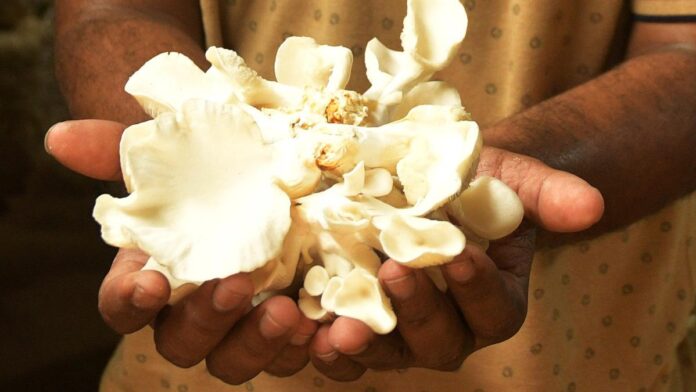Trays full of pressure-cooked sorghum grains dusted with calcium carbonate powder are waiting to be packed into polypropylene (PP) bags at this small facility tucked into a bylane of Thanjavur Main Road on the outskirts of Tiruchi.
They are being prepared to host the mother spawn of what will turn up on plates across southern India as oyster or milky white mushrooms, in a cycle where nature gets a huge helping hand from science.
“Since we are creating an artificial ecosystem to produce what is essentially a seasonal crop throughout the year, there is no room for error. Even a small mistake in watering can lead to huge losses,” says R Jayakumar, who has been running the Shiro Spawn Laboratory from the converted residential building for the past five years, with his wife S. Devi Lakshmi.
The couple, who work as research scientists in Chennai, have used their expertise to establish a successful mushroom spawn (seed) production unit in Tiruchi, and a full-fledged farm (which retails its produce under ‘Hi-Pro Mushrooms’ brand) in their native Velakanatham village in Musiri taluk.
The lab produces four tonnes of mother spawn per month for clients in Andhra Pradesh, Kerala, Karnataka and bigger cities in Tamil Nadu.
“We visit the two facilities regularly from Chennai every week, and manage the business with the help of our family members,” says Devi Lakshmi. “Though mushrooms are easier to grow than most crops, marketing is tough, especially because of their short shelf life. In the case of the mother spawn, we have to ensure that it reaches customers within three days of dispatch from our lab.”
Sorghum pellets cooked under high pressure, are prepared for inoculation with mushroom spores at Shiro Spawn Laboratory in Tiruchi.
| Photo Credit:
M. MOORTHY
Long history
Edible fungi were once thought to be the ‘food of the Gods’ by the Egyptian and Greek civilisations. The Chinese started cultivating mushrooms in 600 AD. They were first introduced to Europe in the 17th century.
Button mushrooms (Agaricus bisporus), native to grasslands in Eurasia and North America, and now grown commercially in Tamil Nadu’s hilly areas, are the market leader in the state.
But oyster (Pleurotus ostreatus) and milky white ( Calocybe indica) mushrooms are more popular in the state’s small farms, especially in warmer climes such as Tiruchi district.
The oyster mushroom, also known as ‘sippi kaalan’ in Tamil, was first cultivated in Germany as a subsistence measure during the First World War. It is now among the most common edible fungi grown for food globally.
Milky white mushrooms, first identified in 1974, from material collected in Kolkata, have enjoyed a strong revival after the Tamil Nadu Agricultural University (TNAU) began its commercial cultivation in the 1990s.
K Ganesh Saravanan, mushroom farmer and businessman.
| Photo Credit:
SPECIAL ARRANGEMENT
Nutritional powerhouse
Considered to be a superfood, mushrooms contain at least 15 vitamins and minerals, including vitamin B6, folate magnesium, zinc and potassium, and anti-inflammatory compounds ergothioneine and selenium. They are one of the few foods with vitamin D, essential for bone strength and improving immunity.
Trainers explain steps in mushroom cultivation at a workshop organised by Mushroom Farmers in Tiruchi.
| Photo Credit:
SPECIAL ARRANGEMENT
“The lockdown has helped people rediscover the nutritional value of mushrooms. Home-bound consumers were able to relish the many medicinal properties of mushrooms in their diet. Their role as a safe non-chemical crop fungicide was also highlighted through new age farming techniques,” says K Ganesh Saravanan, who co-founded Mushroom Farmers with his friend N Karthik in Tiruchi in 2018.
The firm, which has three production units in and around Tiruchi, and a store at Somarasanpettai, specialises in oyster and milky white mushrooms, and has its own local home delivery network.
Currently pursuing doctoral studies on the medicinal properties of mushrooms at TNAU, Coimbatore, Saravanan says the crop is ideal for newcomers.
“You don’t need much land for mushroom farming, as PP grow bags packed with dry paddy hay in a vertical gardening system inside a thatched roof shed are enough. Water usage is also minimal. It is enough to employ a small set of workers to take care of the crop, because mushrooms are very sensitive to changes in temperature,” he says.
Saravana conducts training workshops for diverse groups of people in Tiruchi, and offers free lessons to economically disadvantaged women and persons with disability.
Part-time mushroom grower and cultivation trainer Jones Christopher seen with his crop of oyster mushrooms at his farm in Tiruchi.
| Photo Credit:
M. MOORTHY
Slow and steady
Though it is a potentially booming market, mushroom growers need to be cautious, says Jones Christopher, who runs the RJ Daily Fresh Mushroom Farm from Thuppaki Nagar in Tiruchi.
“If you want to become a full-time mushroom farmer, it will take more than five years to break even, because you cannot change everyone’s palate immediately. I started out five years ago, and still have a target only of around one or two kilograms of production per day because I can only work in the evenings,” he says.
A regular consultant in workshops for Krishi Vigyan Kendra, Sirugamani, Irrigation Management Training Institute, Thuvakudi, and mushroom farmers, Christopher says that the mushroom is ideal for value-added products.
“Farmers can dry their surplus crop and use it as a base for spice mixes, soup powders and pickles. But value-addition requires a different infrastructure and is often more expensive than farming. I’d advise mushroom growers to start slow and wait for their market to develop,” he says.
#Mushroom #cultivation #thrives #Tiruchi #lockdown #young #farmers #treasure #trove #nutrients
